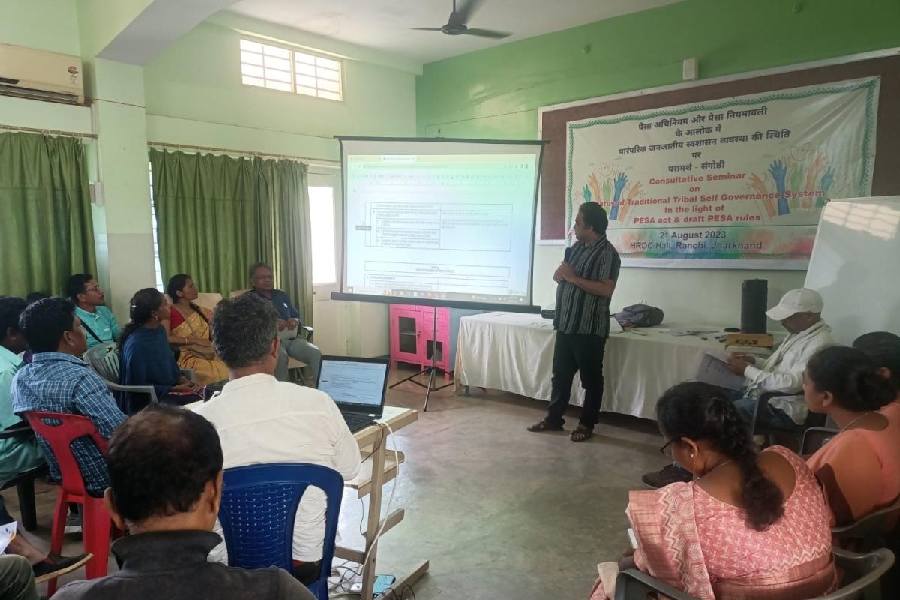Representatives of civil society organisations and traditional village heads of gram sabha have called for a comprehensive change in the draft PESA rules issued last month by the Jharkhand government's panchayati raj department.
The Jharkhand government had published in July draft rules for wide-ranging public consultation for implementing the Provisions of the Panchayats (Extension to Scheduled Areas) Act — or PESA — enacted in 1996 to ensure self-governance through gram sabhas for people living in Scheduled Areas.
In Jharkhand’s case, Scheduled Areas refer to areas identified by the Fifth Schedule of the Constitution. In Jharkhand, 13 of 24 districts are under the Fifth Schedule.
PESA recognises the right of tribal communities in Scheduled Areas to govern themselves through their own systems of self-government. It acknowledges their traditional rights over natural resources.
Representatives of gram sabha representatives from Ranchi, Khunti, Gumla, Simdega, Latehar, Lohardaga, West Singhbhum, East Singhbhum and Seraikela-Kharsawan districts took part in the day-long workshop at Ranchi on Monday.
“During the analysis of the draft rules of PESA, it emerged that there are many anomalies in the proposed rules, which need to be removed. If these anomalies are not removed, then the PESA law will remain only as an object of decoration. A letter will be written to the panchayati raj department on this subject by all the districts, public organisations and gram sabhas,” said Elina Horo, a tribal rights activist and member of the Jharkhand Janadhikar Mahasabha.
“There was anger over the fact that the department took more than ten years to frame the rules and gave only one month's time to the public to provide their suggestion. Most of the gram sabhas do not know about the draft rules. Ideally, all the gram sabhas should have been officially informed about it. We will be forced to boycott the draft PESA rule and a mass movement will be started against it in all the districts if the suggestions are not incorporated,” added Horo.
Members felt that no efforts have been made for the district-level administrative system in the draft rules whereas it is an indispensable condition of PESA law. Members also protested against the rights given to the gram sabha being transferred to the panchayats.
“We also feel that there is no need for several committees for the work of the gram sabha, rather all the work can be done by only one executive committee of the gram sabha. This apart, comprehensive reforms are necessary on many points like land rights, market management, control of institutions, recognition of traditional rules, administration of justice,” added Sushma Biruli, another tribal rights activist.
It was also emphasised in the meeting that in case of difference between the Jharkhand Panchayat Raj Act, 2001 and the PESA Act, 1996, as per provision of Article 254 of the Constitution, the provisions of the PESA Act, 1996 shall prevail.
It was also emphasised that CNT Act, SPT Act, Wilkinson Rule, etc. should be reinforced by the provisions of PESA Rules.










